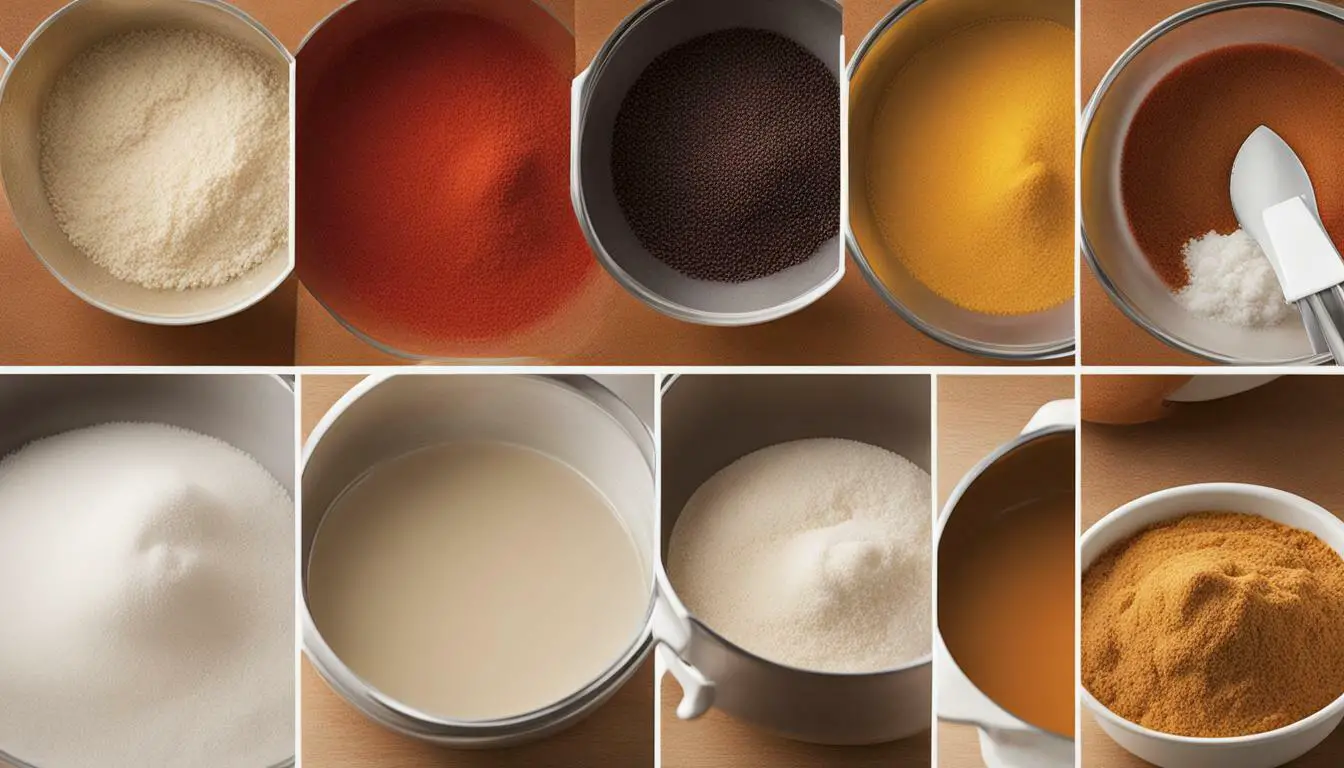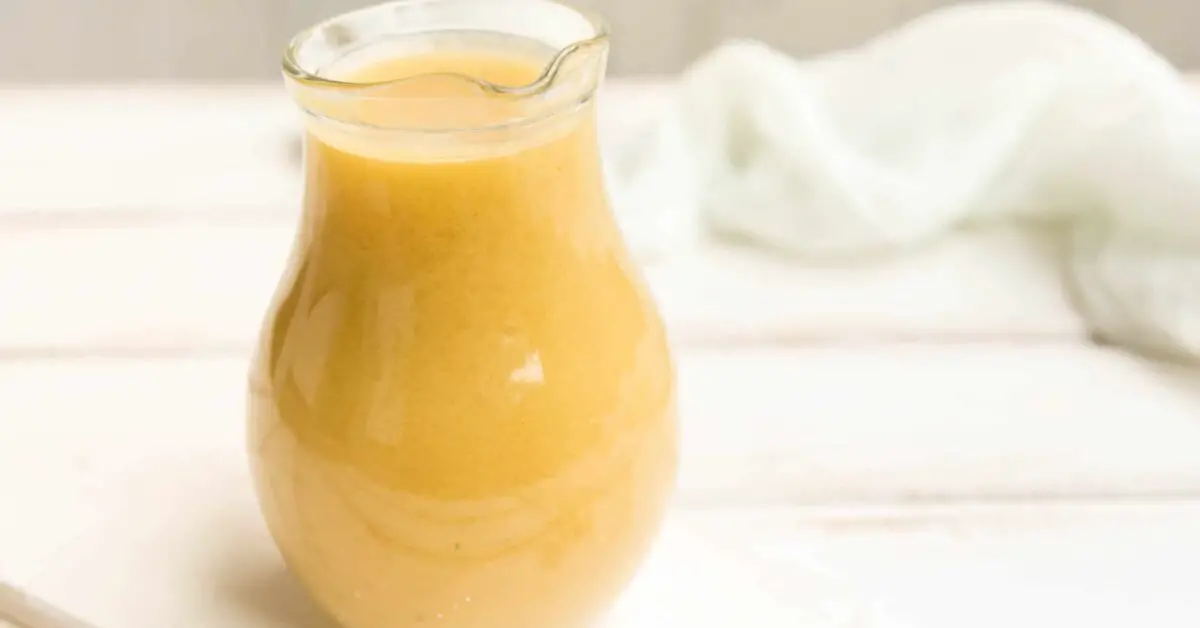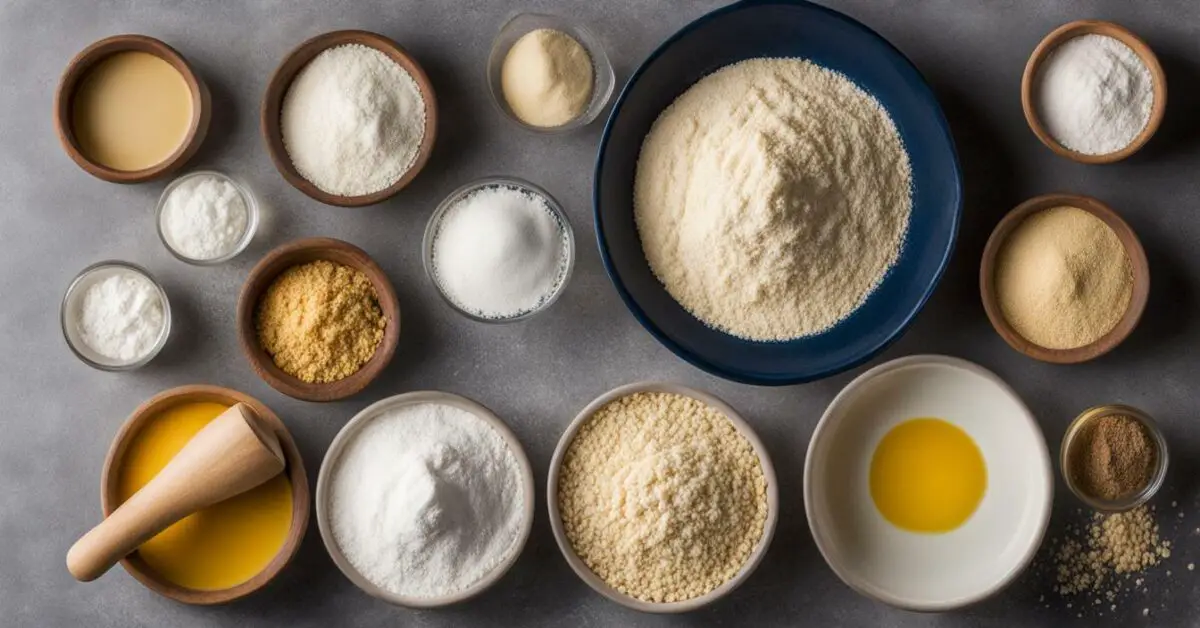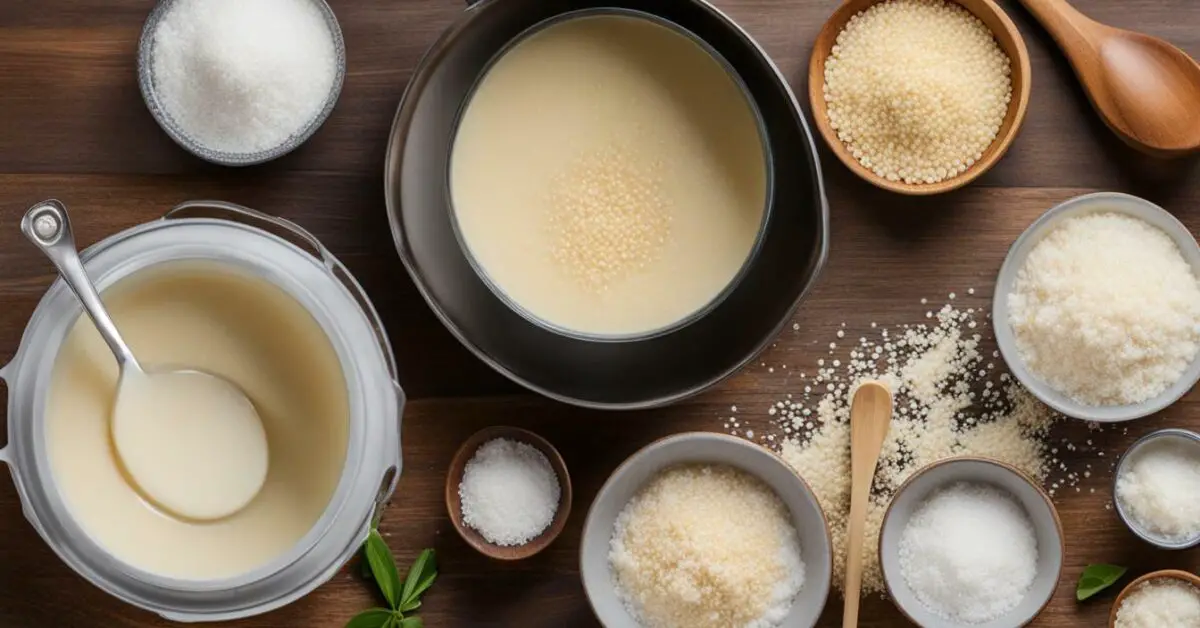
This post may contain affiliate links. Please read my disclosure for more information.
Are you looking for a substitute for cornstarch in your gravy recipe? Discover the three best alternatives that will help you perfect your dish without compromising on flavor or texture.
Key Takeaways:
- Potato starch is a versatile substitute for cornstarch in gravy, offering a similar texture and neutral flavor.
- All-purpose flour can be used as a thickening agent, although it won’t provide the same glossy shine as cornstarch.
- Tapioca flour is an excellent option for puddings and sweet sauces, adding a unique flavor and texture to your dish.
- Other alternatives for cornstarch include rice flour, almond flour, arrowroot powder, and xanthan gum.
- Consider unconventional methods like using crushed walnuts, steamed vegetables, or simmering the sauce to reduce it for thickening gravy.
Potato Starch: A Versatile Cornstarch Substitute
If you’re looking for a versatile substitute for cornstarch in your gravy, consider using potato starch. It offers a similar texture and neutral flavor that will enhance your dish without overpowering other flavors.
Potato starch, derived from potatoes, is a fine white powder that can be used as a thickening agent in gravy. Like cornstarch, it has the ability to absorb liquids and create a smooth, silky texture. It is also known for its ability to withstand high temperatures and works well in both hot and cold dishes.
One of the advantages of using potato starch as a substitute for cornstarch in gravy is its neutral taste. Unlike other thickeners, potato starch does not impart any specific flavor, allowing the other ingredients in your gravy to shine. This makes it a perfect choice for dishes where you want the natural flavors to be the main focus.
When using potato starch in gravy, it is important to remember that it may require a slightly higher amount compared to cornstarch. Start by using a small amount and gradually increase until you achieve the desired thickness. It is also recommended to mix potato starch with a small amount of cold water before adding it to the gravy, as this helps prevent clumping.
| Pros: | Cons: |
|---|---|
| Similar texture to cornstarch | May require a slightly higher amount than cornstarch |
| Neutral flavor | Needs to be mixed with cold water before adding to gravy |
| Works well in hot and cold dishes |
Overall, potato starch is a fantastic substitute for cornstarch in gravy. Its similar texture, neutral flavor, and versatility make it a reliable option. Give it a try and elevate your gravy to new heights!
All-Purpose Flour: An Alternative Thickening Agent
Another option to substitute for cornstarch in your gravy is all-purpose flour. While it may not provide the same glossy shine as cornstarch, it can effectively thicken your gravy and add a hearty texture to your dish. All-purpose flour is a pantry staple that is readily available and cost-effective.
To use all-purpose flour as a thickening agent, start by creating a roux. In a small saucepan, melt equal parts butter and flour over low heat, stirring constantly until it forms a smooth paste. This roux can then be added to your gravy, gradually whisking it in to avoid lumps. As the gravy cooks, the flour will thicken and contribute to a rich, velvety consistency.
It’s important to note that all-purpose flour may alter the taste and appearance of your gravy slightly. It can give the sauce a more opaque look and a slightly grainy texture, but this can easily be masked by the flavors of other ingredients. Additionally, if you have gluten intolerance or are following a gluten-free diet, all-purpose flour is not a suitable substitute.
Table: Comparison of Cornstarch and All-Purpose Flour
| Cornstarch | All-Purpose Flour | |
|---|---|---|
| Thickening Power | More effective | Less effective |
| Glossy Shine | Prominent | Not as prominent |
| Texture | Smooth | Grainy |
| Availability | Common | Common |
| Gluten-Free | Yes | No |
All-purpose flour offers a reliable alternative to cornstarch when thickening your gravy. Its ability to create a thick, hearty texture makes it a popular choice in many kitchens. However, if you prefer a glossy finish or require a gluten-free option, you may want to consider other substitutes such as potato starch or tapioca flour.
Tapioca Flour: Perfect for Sweet Sauces and Puddings
If you’re looking to thicken sweet sauces or puddings without using cornstarch, tapioca flour is an excellent substitute. Its unique properties will help you achieve a smooth and creamy consistency in your gravy.
Tapioca flour, also known as tapioca starch, is derived from the cassava root. It is gluten-free and provides a glossy shine to your sauces, just like cornstarch. Additionally, tapioca flour has a neutral flavor, making it the perfect choice for sweet gravies, custards, and fruit-based sauces.
To use tapioca flour as a substitute for cornstarch, start by creating a slurry. Mix equal parts tapioca flour and water, then add it to your gravy gradually while stirring continuously. Allow the mixture to simmer for a few minutes, and you’ll notice it thickening to perfection.
When using tapioca flour as a thickening agent, keep in mind that it has a stronger thickening power than cornstarch. So, be careful not to add too much, as it can make your gravy too thick or even gel-like. It’s always recommended to start with a small amount and adjust according to your desired consistency.
Table: Comparison of Cornstarch Substitutes for Gravy
| Substitute | Texture | Flavor | Thickening Power |
|---|---|---|---|
| Potato Starch | Similar to cornstarch | Neutral | Comparable to cornstarch |
| All-Purpose Flour | Heavier, may affect texture | May impart a slightly floury taste | Requires more flour for similar thickness |
| Tapioca Flour | Smooth and gel-like | Neutral | Stronger thickening power |
While tapioca flour is an excellent substitute for cornstarch in sweet sauces and puddings, don’t hesitate to explore other alternatives mentioned in this article. Rice flour, almond flour, arrowroot powder, and xanthan gum can also serve as viable options when thickening gravy. You can even get creative and experiment with crushed walnuts, steamed vegetables, or simmering the sauce to reduce it further.
Now you have a range of substitutes to choose from when cornstarch is unavailable or not suitable for your dietary needs. Whether you prefer tapioca flour for its smoothness or want to try something new, these alternatives will help you achieve the perfect consistency and taste in your gravy.
Other Alternatives and Tips for Thickening Gravy
In addition to the main substitutes mentioned earlier, there are several other alternatives you can consider when substituting cornstarch in your gravy. Rice flour, almond flour, arrowroot powder, and xanthan gum can all be used to achieve the desired thickening effect. Rice flour, in particular, is a gluten-free option that works well as a thickening agent. Almond flour, on the other hand, adds a subtle nutty flavor to your gravy. Arrowroot powder, derived from tropical plants, has a smooth texture and is great for achieving a glossy finish.
If you’re looking for a gluten-free alternative, xanthan gum is a great option. It’s a natural thickener that is commonly used in gluten-free baking and cooking. It has the added benefit of providing a silky texture to your gravy.
Aside from these substitutes, you can also try some unconventional methods of thickening your gravy. Crushed walnuts can be used to add thickness and a unique flavor to your sauce. Steamed vegetables, like cauliflower or butternut squash, can be pureed and added to your gravy for a natural thickening effect. And if you prefer a more traditional approach, simply simmering the sauce for a longer period of time will allow it to reduce and thicken naturally.
Whether you’re avoiding cornstarch due to dietary restrictions or simply want to experiment with different flavors and textures, these alternatives and methods will help you achieve a thick and delicious gravy without compromising on taste.
FAQ
What are the best substitutes for cornstarch in gravy?
The best substitutes for cornstarch in gravy are potato starch, all-purpose flour, and tapioca flour.
How does potato starch compare to cornstarch as a thickening agent?
Potato starch has a similar texture and neutral flavor, making it a versatile option for thickening gravy.
Can all-purpose flour be used as a substitute for cornstarch in gravy?
Yes, all-purpose flour can be used as a thickening agent in gravy, but it won’t provide the same glossy shine as cornstarch.
What is tapioca flour used for in gravy?
Tapioca flour is a great substitute for cornstarch in puddings and sweet sauces, adding texture and flavor.
Are there any other alternatives for substituting cornstarch in gravy?
Yes, other alternatives include rice flour, almond flour, arrowroot powder, and xanthan gum. You can also thicken gravy using crushed walnuts, steamed vegetables, or by simmering the sauce to reduce it.


